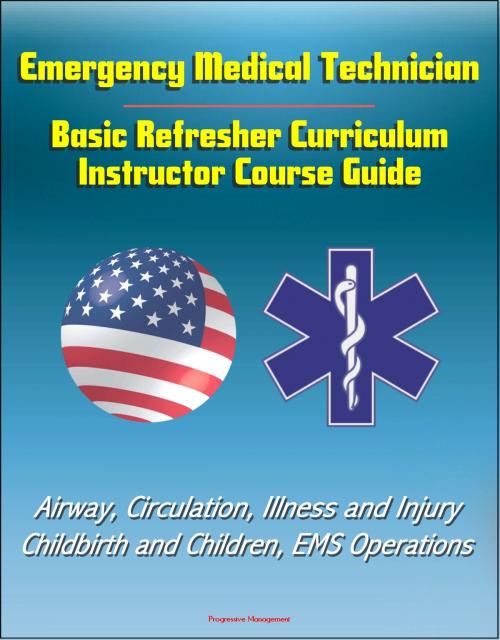Emergency Medical Technician: Basic Refresher Curriculum Instructor Course Guide - Airway, Circulation, Illness and Injury, Childbirth and Children, EMS Operations
Nonfiction, Health & Well Being, Medical, Allied Health Services, Emergency Medical Services, Specialties, Emergency Medicine| Author: | Progressive Management | ISBN: | 9781476031583 |
| Publisher: | Progressive Management | Publication: | August 31, 2012 |
| Imprint: | Smashwords Edition | Language: | English |
| Author: | Progressive Management |
| ISBN: | 9781476031583 |
| Publisher: | Progressive Management |
| Publication: | August 31, 2012 |
| Imprint: | Smashwords Edition |
| Language: | English |
This document is a course guide for the basic EMT refresher training program. It will provide information which will help program administrators and instructors plan and implement a course.
The EMT-Basic Refresher curriculum is the minimum acceptable content that must be included in any EMT-Basic refresher educational program. This program should consist of a minimum of 24 classroom hours. The refresher training program is divided into six modules. This organizational plan was chosen to begin a process of standardization among National Standard Curricula.
The six modules are:
I. Preparatory
II. Airway
III. Patient Assessment
IV. Medical/Behavioral
V. Trauma
VI. Obstetrics, Infants and Children
This refresher course is competency based. Specific number of hours to complete each module have not been included. EMTs who successfully complete this course must demonstrate competency over the knowledge and skills outlined in this refresher education program.
The first part of each module lists the specific patient care task in a bold face font. Immediately below the listed task is the cognitive learning objectives which correspond to the specific task. The list of tasks indicates the minimum level of proficiency required of the EMT-Basic to assure safe and effective practice. The psychomotor and affective objectives relate to the overall content of the module.
Contents: Introduction * Course Overview * Course Planning Considerations * Course Conduct and Evaluation * Testing and Evaluating the Student * Program Evaluation * Acknowledgment * Module I, Preparatory * Module II, Airway * Module III, Patient Assessment * Module IV, Medical/Behavioral * Module V, Trauma * Module VI, Obstetrics, Infants, and Children * Appendix A, USDOT Curriculum Objectives EMT-Basic
This document is a course guide for the basic EMT refresher training program. It will provide information which will help program administrators and instructors plan and implement a course.
The EMT-Basic Refresher curriculum is the minimum acceptable content that must be included in any EMT-Basic refresher educational program. This program should consist of a minimum of 24 classroom hours. The refresher training program is divided into six modules. This organizational plan was chosen to begin a process of standardization among National Standard Curricula.
The six modules are:
I. Preparatory
II. Airway
III. Patient Assessment
IV. Medical/Behavioral
V. Trauma
VI. Obstetrics, Infants and Children
This refresher course is competency based. Specific number of hours to complete each module have not been included. EMTs who successfully complete this course must demonstrate competency over the knowledge and skills outlined in this refresher education program.
The first part of each module lists the specific patient care task in a bold face font. Immediately below the listed task is the cognitive learning objectives which correspond to the specific task. The list of tasks indicates the minimum level of proficiency required of the EMT-Basic to assure safe and effective practice. The psychomotor and affective objectives relate to the overall content of the module.
Contents: Introduction * Course Overview * Course Planning Considerations * Course Conduct and Evaluation * Testing and Evaluating the Student * Program Evaluation * Acknowledgment * Module I, Preparatory * Module II, Airway * Module III, Patient Assessment * Module IV, Medical/Behavioral * Module V, Trauma * Module VI, Obstetrics, Infants, and Children * Appendix A, USDOT Curriculum Objectives EMT-Basic















